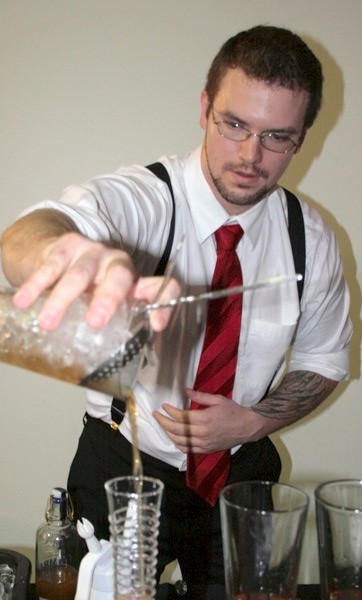 “Y’know, if someone’s being an a**hole it’d be nice to be able to tell them so,” a friend of mine opines over drinks. It is not the first time I have heard this refrain.
“Y’know, if someone’s being an a**hole it’d be nice to be able to tell them so,” a friend of mine opines over drinks. It is not the first time I have heard this refrain.
A host of us are fresh from whipping up demonstrations of the notoriously taxing Ramos Gin Fizz at a local food and drink show and have spent the last several hours eating and (mostly) drinking our way out the front door and into the the comfort of a local sports bar. Now away from the show floor and with the assistance of a liberal helping of beer we are finally beginning to shed our second skins, and I’m really trying to let it all go but this comment gets me thinking.
Many publications spend a lot of time on the bartender/customer relationship. More specifically, they spend an inordinate amount of time stupidly sensationalizing the relationship as a sort of antagonistic symbiosis (I’m referencing anything titled “Top x Things Your Bartender Hates” or any derivation thereof). I understand the popularity of this style of article among editors and journalists but I don’t appreciate it. Quoting bartender’s and customer’s complaints may be easy and sell well but the derived articles are almost categorically cheap and disingenuous. Bartenders, good ones, are just people with a passion for drinks and community who’ve managed to commute it into a way of making a living. Shockingly enough, most of us like our customers quite a bit. Admittedly, we like some more than others.
Being in front of a room full of people all night, four to six nights a week is easily as emotionally exhausting as it is physically. To manage this aspect of the job much like any professional, a bartender carries to work a collection of tools, the first of which isn’t the barspoon or a shaker tin but a finely honed professional persona that exists as a layer between us and the customer. Some, like myself, shoot for a sort of businesslike gregariousness. Others are coyly flirtatious, some are fast-quipping and a few bartenders I’ve known work the room like it’s a game of seduction. Regardless of preference, each persona is endemically imbued with a sort of psychic wall between us and the rest of the world, making it as much a mental barrier as the bar is a physical one. Doing this is a practiced skill, developed to handle being on stage for thirty to forty hours a week and it is what allows us to continue being nice despite that mouthy SOB at the end of the bar who keeps hollering and snapping his fingers on a Friday night.
But back to the point: Wanting to tell someone they are an a**hole is not indicative of a general conflict between the positions of server and customer. It’s just a predictable end-point between a host and a guest who has crossed the line of acceptable behavior. You’d kick someone out of your home for behaving that way and disturbing the rest of the guests. We feel much the same way only we have to be much, much nicer about it because unlike with an unruly friend, we can’t have coffee and smooth things over the next day. Every time we eighty-six a customer, we lose five. That’s not necessarily true but its the metric that I use. If you kick one person out they’ll likely be too offended or embarrassed to come back again. Consequently, if they go out with four of their friends they’ll probably go anywhere but to your establishment, which loses the house anywhere from fifty to two-hundred dollars on a low-end average for the night, not to mention your tips. Out of solidarity or habit, their friends might stop coming in altogether as well and a terrible sort of waterfall descends on your profits.
These are the demons that haunt our nights, so when all is said and done and we go home to strip off that persona and become permeable individuals again, the feeling is as good as stripping away sweaty work clothes and putting on a favorite t-shirt. After a rough night this is usually followed with cathartic b*tching about the worst customers and a few beers or glasses of wine as we loudly wish we could pick and choose every single person who walked through the front door. But we don’t mean it. What we mean is what my friend said, we just wish we could tell the bad ones where to shove it and then to go right back to what we love.
~Jabriel Donohue, Bar man at Portland’s Acadia and writer at Glass Playground
Reprinted with permission. Photo credit: Jennifer Heigl / Daily Blender
